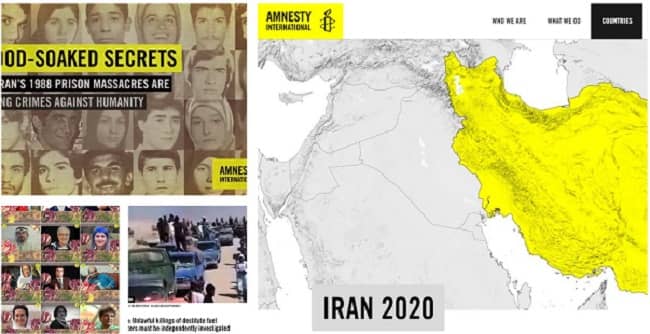Amnesty International has published its annual report on human rights violations in Iran. The report was published on Wednesday, April 7, 2021. Amnesty International’s report strongly criticized the human rights situation in Iran, stating that in 2020 the Iranian regime increasingly used the death penalty to suppress political protests, dissidents, and ethnic and religious minorities.
1988 massacre of political prisoners in Iran
Part of this report states: “The authorities continued to commit crimes against humanity by systematically concealing the fate and whereabouts of several thousand political dissidents forcibly disappeared and extrajudicially executed in secret in 1988. Mass graves believed to contain their remains were subject to ongoing destruction”.
Amnesty International also writes in part of its report on enforced disappearances:
“The authorities continued to commit the crime against humanity of enforced disappearance by systematically concealing the fate and whereabouts of several thousand political dissidents who were forcibly disappeared and extrajudicially executed in secret in 1988 and destroying unmarked mass gravesites believed to contain their remains.
Security and intelligence forces threatened victims’ families with arrest if they sought information about their loved ones, conducted commemorations, or spoke out”.
Violation of freedom of expression
Another section of the report cites repression of freedom of expression, the illegal use of force to suppress protests, and the indiscriminate detention of hundreds of protesters, dissidents, and human rights defenders. Part of the Amnesty International report is devoted to widespread and organized violence against women and ethnic and religious minorities, plus the enforced disappearances, torture and other cruel and inhuman treatment. Amnesty also criticize the systematic impunity that perpetrators of human rights violation enjoy in Iran.
Execution as a weapon of political repression
Amnesty International has accused the mullahs’ regime of carrying out executions in Iran in highly unjust courts and wrote:
“Executions carried out after unfair trials. One victim was executed in public, and others were in secret. Those executed included people who were under 18 at the time of the crime”.
“A disproportionate number of those executed were members of Iran’s Kurdish and Baluchi minorities.”
Amnesty International referred to the execution of Ruhollah Zam, director of the Amad News channel. It stressed that the Iranian government was using the execution as a “weapon of political repression”. Amnesty International referred to the covert executions and executions of persons under 18 at the time of execution.
Impunity of perpetrators
In part, the report also writes about the impunity of perpetrators of crimes against humanity: “No public official was investigated or held accountable for crimes of unlawful killings, torture and enforced disappearance or other grave human rights violations.”
“Impunity prevailed for past and ongoing crimes against humanity related to the 1988 prison massacres, with many of those involved continuing to hold top judicial and government positions, including the current Head of the Judiciary and the Minister of Justice“.
